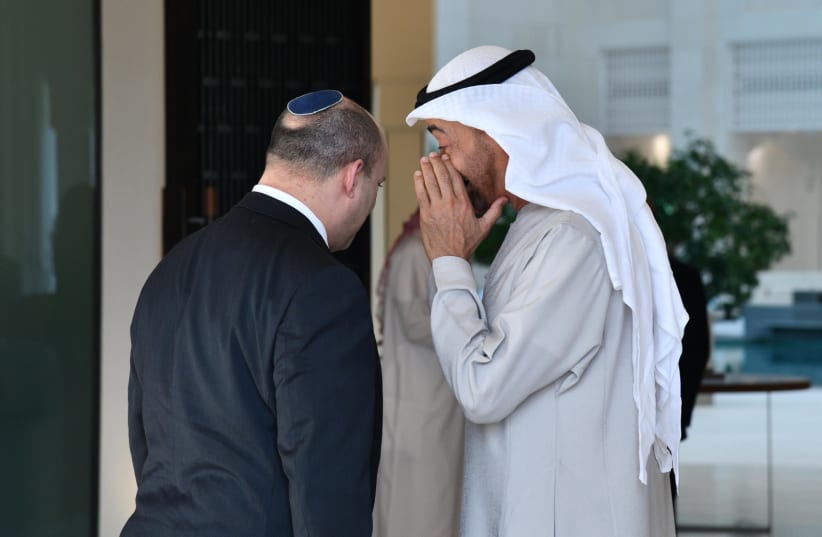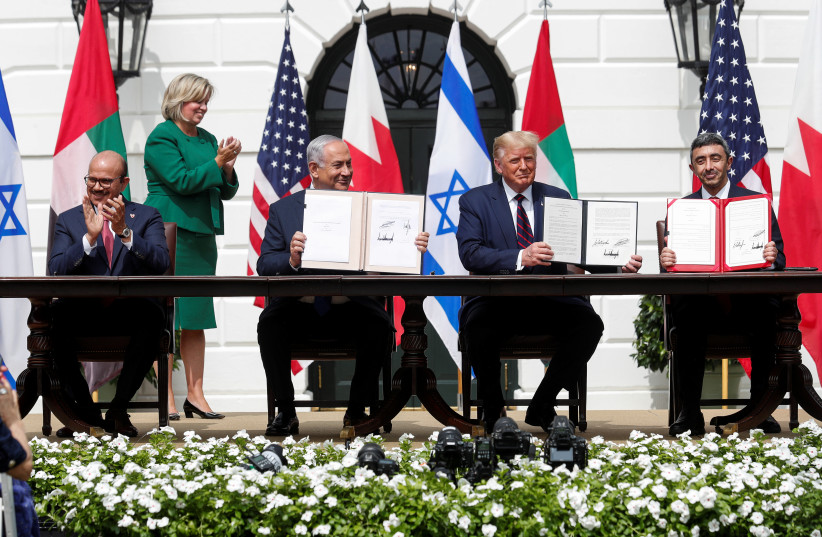The original Quad, formed by the United States, India, Australia and Japan has been at the center of the White House’s strategy to counter the growing Chinese aggression and influence in the Indo-Pacific.
The new Quad (now known as the West Asian Quad), which brings together the US and India with Israel and the United Arab Emirates, will be the grouping to watch out for in the coming months. This grouping will be key to the security of the Middle East and the larger Indo-Mediterranean.
The Abraham Accords and the start of a new era
The Abraham Accords were a surprise to the global geopolitical framework when they were conceived and signed between Israel and the UAE at the peak of the pandemic in August 2020. Today the players have changed. Neither is Donald Trump the president of the US nor is Benjamin Netanyahu the prime minister of Israel. Despite these changes not only has the relationship between the UAE and Israel strengthened, it has quickly evolved to create a mini-grouping with two strong mutual allies, the US and India.
Both Israel and the UAE have historic ties with India. India’s links with the Jewish community in the Middle East is well documented as are Jewish communities in India. Despite India officially supporting the Palestinian position since Israeli independence, recognition and informal cooperation between the countries date back to the 1953.
Since full diplomatic relations were established in 1991, Israel is now the second largest defense supplier to India after Russia. There is probably no other country that has a closer security cooperation with the Indian security establishment than Israel. Both countries are victims and poster targets of Islamic extremism, and the November 26, 2008 attacks on Mumbai made both countries develop a strong strategic bond.
The emirates that constitute the UAE have ancient links with India, even using the Indian rupee as their currency until the mid-20th century. Today around 38% of the UAE’s population is estimated to be from India.
Both Israel and the UAE consider the US as their first and foremost ally. It would be a natural alliance for a new grouping to arise, between these four countries, which are not only bound together by history but by rapid change in the global geopolitical scenario where their interests are common, while their enemies unite.
The Iran question
Iran is probably the single most important question for the West Asian Quad and possibly for global security. The Biden team has done its best to try and undo the damage to Obama’s legacy of the Joint Comprehensive Plan of Action by the Trump administration. Iran was arguably the US’s and Israel’s closest ally in the Persian Gulf before the Iranian Revolution of 1979.
Since the revolution, the US and Israel have been considered the greatest enemies by the new Islamic Republic. Today, the theocracy’s hate of the US and Israel is led by a grouping of aging revolutionaries who are themselves well into their 70s and have repeatedly pushed the country into economic and political isolation due to their anti-US and anti-Israel rhetoric. Iran also has the largest standing global network of narco-Islamic terrorists, which spans from Venezuela to Afghanistan, in its efforts to maintain Shi’ite dominance against Sunni regimes.
Hezbollah and the Houthis are among several militia that Iran has inspired and supported and tries to control and influence. The changing global geopolitical, social and economic scenario is however beyond the control of the Iranian theocracy, which seems to be grasping at straws while trying to force a nuclear program it can ill afford and which is frankly useless in the modern, post-Cold War global order, even as a deterrent.
Iran’s role in the Shi’ite-Sunni conflict is older than its ideological conflict with the US and Israel and traces back to the Islamization of the Persian Empire. The UAE and Iran share sea borders in the Persian Gulf, and the UAE is an ancient pathway for Iranian trade in the Middle East, Africa and Asia. It is also the home of a significant Iranian population, which is an important part of the UAE’s economic fabric.
Tensions between the UAE and Iran have escalated over the past years, even though in the past few months the UAE has tried to mend diplomatic fences, trying also to withdraw its engagements in global conflicts from Libya to Yemen, where it has regularly countered Iranian proxies. However the UAE’s closeness to the US and now to Israel continue to create tensions between the maritime neighbors who control the Persian Gulf.
In the center of all these disagreements and conflicts, Iran has created criminal monsters such as Hezbollah, which it can neither fully control nor destroy. In its need for infrastructure and cash to keep its weakening economy afloat it is following Pakistan’s example and is on its way to a strong dependence on China. This final desperate choice will also eventually cost it a historical ally, India.
India has just started to publicly mention its security issues with Iran. Not only has Iran’s supreme ayatollah started mentioning Kashmir at key points during India’s alliance with Israel, recent attacks on Indian soil against Israeli diplomats exposed a larger network of Iranian terror on Indian territory.
This millennial relationship is being sacrificed in Tehran’s desperation to keep its proxies prospering, from Hamas to the Assad regime in Syria, while it is barely able to feed its own population. Iran’s primary ally, Russia, battles to keep its position with India as its largest defense supplier, and despite Iran’s increasing closeness to China and Pakistan, the Indian government has tried its best to maintain a cordial relationship with Iran with two visits by Subrahmanyam Jaishankar, India’s foreign minister, to Tehran in 2021.
Despite all these challenges, all members of the West Asian Quad seem to be aware that the time for a US-led peace deal with Iran on the Obama model is over, and any deal must include Israel. Neither the UAE nor India wants to be in a situation to choose sides between Iran and Israel and the US, so both allies will do their best to walk the diplomatic tightrope and try and keep Tehran from pushing for an open conflict.
India will also hope to keep Tehran out of China’s sphere as Iran and India share security concerns with Russia on Afghanistan and the Taliban. Most importantly, India controls the Chabahar Port in Iran, which is a key non-land transport route to Afghanistan and Central Asia, Iran’s only oceanic port, which is just 170 km. west of Pakistan’s Gwadar Port, controlled by China.
The Chinese dragon
The US and India remain deeply concerned about China’s growing influence in allied countries. The UAE, which had a thriving relationship with China, has for now, seemingly hit the pause button. A key strategic military base being developed by China in Abu Dhabi, has been shelved for the time being under US pressure. Israel, which has used China in the past to develop infrastructure and has a thriving technological relationship with Beijing has now become cautious of China’s investments into Israeli technology companies. Israel is also the main provider of cybersecurity technology, often deployed against Chinese, Russian and Iranian cyberattacks by all the allies.
The Israel security establishment is now using the sale of Spacecom, a key strategic satellite company, to a Hungarian communications corporation with ties to Hungarian Prime Minister Viktor Orbán, to create grounds for a golden veto.
“A security source told Haaretz that following the sale of various strategic assets to China, such as Haifa Port, desalination facilities, food companies and light rail works, the defense establishment has decided to change its policy and not allow a foreign entity to acquire more than 20% of an Israeli company defined as strategically important.” (Haaretz, December 5)
China’s growing influence and alliance with Iran and Pakistan, both of which have a very strong anti-Israel and anti-US bias, only helps hasten Israel’s distancing from China.
A new beginning
Prime Minister Naftali Bennett recently visited the UAE, cementing a bond with the Crown Prince Mohammed bin Zayed Al Nahyan. MBZ, as the crown prince is widely known, is an enlightened monarch who is a pragmatic and realistic ruler. While he recalibrates the UAE’s role in fluid global geopolitics, he is focused on bringing the West Asian Quad closer to ensure the UAE’s political and economic centrality.
Next, Bennett will probably visit India early in the new year to cement another relationship that was developed by his predecessor, with Indian Prime Minister Narendra Modi. Bennett will need the support of both the Indian and UAE leaders if he is to successfully make his case to the White House, which is desperate for a deal with Iran.
MBZ and Modi will need Bennett to air their concerns to President Joe Biden so that publicly they do not disturb their status quo with Iran. The West Asian Quad is the security blanket that Israel needs against Iranian aggression. Even the hawks in Tehran will not support all-out conflict that drags India and the UAE against Iran.
Unlike the naval Quad, the West Asian Quad is central to global security and intelligence with its influence and interest that extends from Africa to Asia. Where NATO and Europe fall into this puzzle and what role they will have, if any, is still to be seen. Meanwhile, we all wait with bated breath to see what a post-Merkel era in Germany and Europe will bring.
The writer is the president of Glocal Cities. He is a political researcher, consultant and entrepreneur and has worked in Europe, the Middle East and Africa for two decades. He has interacted with leaders and decision-makers and works closely with people from all walks of life all over the Middle East.

